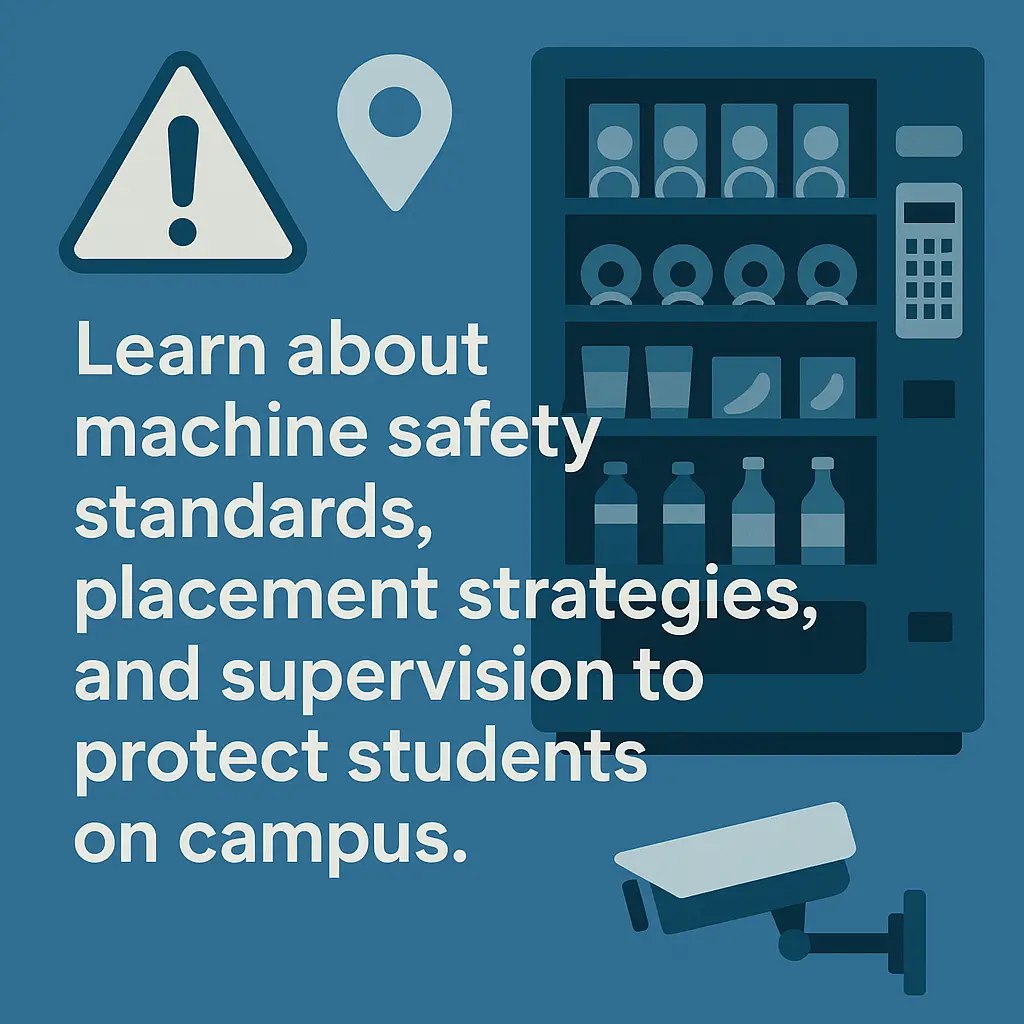Vending Machine Safety in Schools
Learn about machine safety standards, placement strategies, and supervision to protect students on campus.
Back to Vending for Schools ResourcesLearn about machine safety standards, placement strategies, and supervision to protect students on campus.
Back to Vending for Schools ResourcesSchools can improve vending safety by securing machines, following ADA placement guidelines, and ensuring regular checks. Setting up machines in well-supervised spaces and using vendors committed to safety compliance helps minimize risk for students and staff.
![]() Proper anchoring prevents tipping and increases student safety
Proper anchoring prevents tipping and increases student safety
![]() Placing machines in supervised areas deters misuse and vandalism
Placing machines in supervised areas deters misuse and vandalism
![]() Routine vendor maintenance ensures compliance and safety standards
Routine vendor maintenance ensures compliance and safety standards

Ensuring vending machine safety in schools is not just best practice—it’s essential. School administrators and facility managers must be mindful of equipment stability, placement, and routine maintenance to avoid accidents and liability concerns. When introducing vending machines into a campus environment, both federal and local safety standards must be followed.
One of the most overlooked hazards in school vending is machine tipping. Machines must be securely anchored to prevent tipping injuries, especially in areas frequented by younger students. Reputable vending providers typically offer anchoring kits and follow established mechanical guidelines to minimize risks. If a school is retrofitting vending into older buildings, it's important to inspect flooring and wall materials to determine the most secure installation option.
Strategic placement of machines is equally important. Vending equipment should be installed in well-lit, supervised areas like lobbies, administrative wings, or faculty lounges. Avoid placing machines in hallways with limited visibility or unsupervised corners where tampering, vandalism, or misuse could occur. For security-conscious setups, some schools opt for glass-front smart vending machines with real-time usage tracking and surveillance integration.
Vendor accountability also plays a key role in maintaining safety. Schools should partner with providers that commit to frequent restocking and equipment checks, especially to ensure any mechanical issues—such as jammed dispensers or failed payment readers—are caught early. Machines that are regularly serviced and monitored not only function better but also support long-term safety by preventing buildup of expired items or loose parts.
Accessibility is equally important. Machines must not block fire exits and should meet ADA height and reach regulations. Ignoring such standards could lead to non-compliance penalties or hinder student access to nutrition between meals.
To enhance safety and branding, schools might explore custom-wrapped machines that display nutrition messages or anti-bullying campaigns. For staffing-sensitive environments, reviewed vendor reliability evaluation methods may also apply when choosing a vending partner who prioritizes safety and routine care.
If you're exploring vending options for your business, Vending Exchange can help simplify the process. Delivery, Installation and Equipment is provided at no cost to you - vendors provide the machines, keep them stocked, and handle all servicing. Whether you need a provider or full-service management, just fill out the form on this page to get started.
Vending machines should be properly anchored to the floor or wall to prevent tipping hazards. Most vending vendors offer anchoring kits and follow mechanical safety guidelines during installation.
Install vending machines in supervised, high-visibility areas like administrative offices, staff lounges, or lobbies. Avoid unsupervised hallways or areas with poor lighting.
Yes, vending machines in schools must be ADA-compliant. This includes height, reach, and clear floor space requirements to ensure accessibility for all students.
Machines should be checked at least weekly by vendors for restocking and inspecting mechanical functions. Schools may opt for providers who offer remote monitoring or smart equipment.
No. Vending machines must not obstruct fire exits, access to fire equipment, or evacuation paths. Violating this can result in code violations or unsafe conditions during emergencies.
Glass-front or smart vending machines with real-time monitoring are excellent choices for schools. They enhance safety, deter vandalism, and provide visibility of product stock.
Place machines in monitored areas, use surveillance when possible, and choose vendors who offer tamper-resistant machines with smart tracking features.
Immediately report the issue to your vending vendor. Regular service agreements ensure rapid repairs and replacement if needed to prevent safety risks.
Yes, as long as machines are age-appropriate, securely anchored, placed in supervised spaces, and monitored. Some schools restrict access to machines during school hours for added safety.
Qualified vendors monitor machines regularly and perform equipment safety inspections to ensure all pieces function correctly, minimizing risk for schools and students.